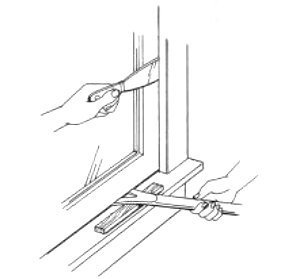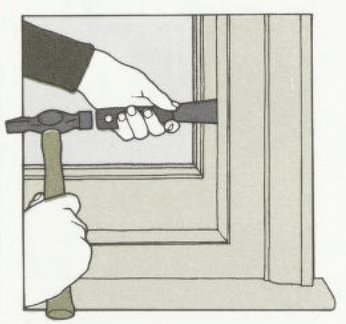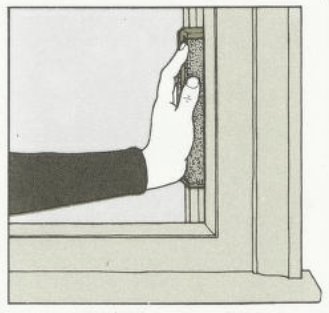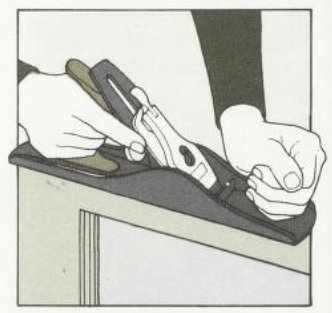Double-hung windows are all too prone to sticking but you can usually open them with muscle and common sense.
Contents
- Is the Window Unlocked?
- A Window Painted Shut
- Window Sticking Video
- A Window Requiring Cleaning or Lubrication
- Loosening The Window By Tapping it with a Hammer and Wood Block
- Last Resort: The Pry Bar
- If All Else Fails with Your Stuck Window..
- More Tips for Un-Sticking a Window
- A Step-by-Step Method for Freeing a Stuck Window
Is the Window Unlocked?
First, check the window to make sure it’s unlocked. Assuming the catch is open, the most common problem is that the window was painted shut, and the paint is holding the sash shut.
A Window Painted Shut
Use a stiff putty knife or paint scraper to cut the paint sealing the joint between the window sash-the sliding part–and the frame. Push the blade of the knife straight into the joint.
If it won’t go in with mild pressure, tap it in lightly with a hammer to break the paint all around the sash. Assuming this was the only problem, the window should open.

Window Sticking Video
If you’d prefer video instruction on loosening your window, here’s a helpful one from “This Old House”:
A Window Requiring Cleaning or Lubrication
If the window still doesn’t open, the tracks that the sash moves in may be blocked.
Examine the tracks above the sash.
If they’re clogged with paint or dirt, clean them carefully with an old chisel.
Don’t dig into the wood, but remove lumps and bulges.
Sand the inside of the tracks smooth with medium grit sandpaper, then spray them with a lubricant, and raise the window
Loosening The Window By Tapping it with a Hammer and Wood Block
If the grooves are clean but the window still sticks, place a B-inch-long wood block flat against the wood of the sash frame and tap it gently with a hammer to push the sash back from the window frame.
Work all around the edges of the sash with the block and hammer, tapping very gently and evenly along the sash frame, then try to open the window.
If it opens clean, sand, and lubricate the tracks.
If tapping on the sash doesn’t work, tap the block sideways into the window frame, to push it the other way.
Try the window again and clean and lubricate it if it opens.
Last Resort: The Pry Bar
As a last resort, use a pry bar.
Work from the outside of the window if you can.
Slip the flat end of the pry bar into the joint between the bottom of the window Sash and the windowsill.
Set a block of wood on the windowsill under the bar to improve leverage and protect the wood.
Pry gently at the corners of the window.
Pushing the bar down to move the window up, pry first one corner, then the other, moving slowly back and forth toward the center of the sill.
Work carefully, and don’t force the window open.
If it does open, clean, sand, and lubricate the tracks.
If it doesn’t repeat the wood block procedure from the inside.
Clean and lubricate as before.
If All Else Fails with Your Stuck Window..
It cutting pounding and prying don’t work, leave the window alone.
The problem may be caused by excessive swelling from humidity, by extreme misalignment of the sash, or by uneven settling of the house.
Don’t make it worse, call a carpenter.
More Tips for Un-Sticking a Window
Windows stick because the channels or guides need cleaning and lubricating, or because they have been painted shut
Loose windows that refuse to stay open may have broken sash cords or chains.
New double-hung windows are balanced by springs, and have adjustment screws to control window movement.
To free a window painted shut, cut the paint film.
Insert a paint zipper or utility knife into crack between window stop and sash.
Also try placing a block of scrap wood along the window sash and tap lightly with a hammer to free the window.
A Step-by-Step Method for Freeing a Stuck Window
If the window is sticking, either new paint has hardened between the moving parts or the wood has swollen.

Wedge a scraper between the window frame and sash.
OR tap all around the frame with a hammer on a soft wood block.
When the paint layers have split, push the sash up and rub the channel with sandpaper.

If the sash jams constantly, take it out. Pry out the strip that holds the sash in place.
Remove the sash cords, tying a knot in the end of each so that they don’t disappear into the framing.

Plane the sash edges to fit. Replace the sash.
Reinstall the molding.
